#supremecourtjustice
Text
The hardest decision

The hardest decision a woman can make isn't yours
https://www.instagram.com/p/CfWla-aKWbH/
#righttochoose#supremecourtjustice#roevswade#womensrights#illustration#wealreadyfoughtforthis#editorialillustration#roe#abortionrights#abortionishealthcare#womenmatters#abortionisawomansright#girlsmatter#abortionban#ruthbaderginsburg#supremecourt#abortionisahumanright#artists on tumblr#illustrators on tumblr
38 notes
·
View notes
Photo
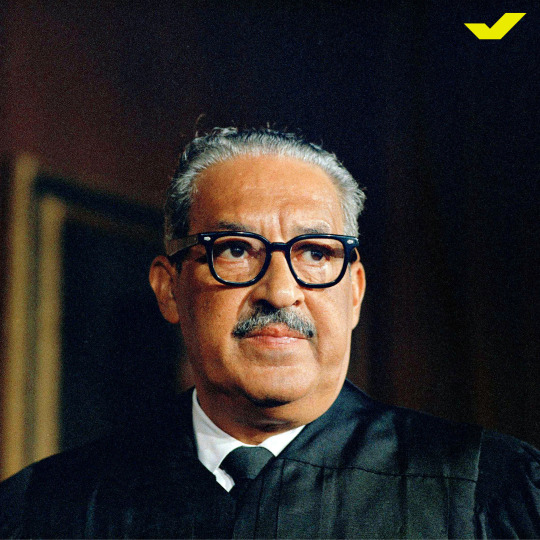
On this day in 1908, Supreme Court Justice Thurgood Marshall was born in Baltimore, Maryland
As the NAACP’s chief counsel from 1938 to 1961, Marshall argued more than a dozen cases before the Supreme Court, challenging racial segregation.
He won nearly all of these cases, including a critical victory in Brown v. Board of Education, in which the Supreme Court ruled that segregation violated the equal rights clause of the 14th Amendment to the Constitution.
5 notes
·
View notes
Photo
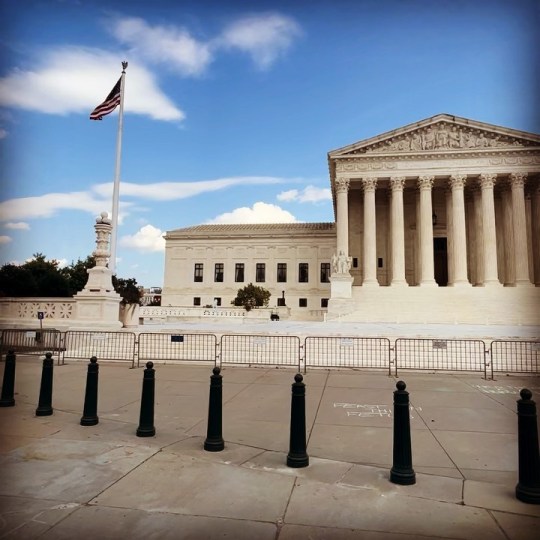
#throwbackthursday #washingtondc #supremecourtjustice (at Supreme Court of the United States) https://www.instagram.com/p/CjG92VILmLAqkbzNqtlUmCJGZRc3zx4cPlR6GM0/?igshid=NGJjMDIxMWI=
0 notes
Photo
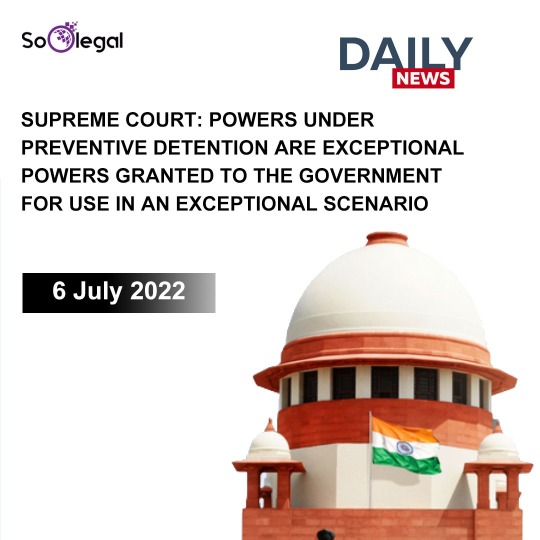
The Supreme Court ruled that preventive detention cannot be used to counter regular law and order situations.
According to the court, it is an "exceptional power" of the state that affects an individual's personal liberty and must be used sparingly.
For further information, refer to this News Report By Team SoOlegal.
#supremecourtjustice#SupremeCourt#preventive#detection#lawyers#law#SoOLEGAL#exceptional#power#state#personal#liberty
0 notes
Photo
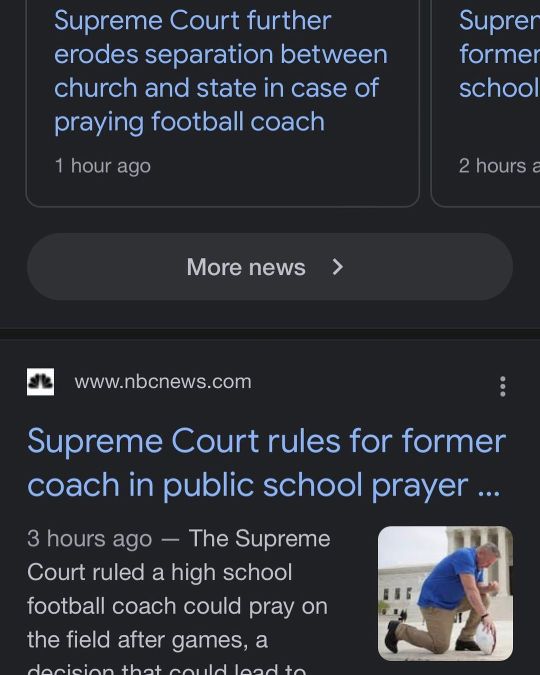
Trying to erode separation of church and state. Just remember this means anyone can pray. Us #pagans #satanists other #religions that aren’t “Christian” can pray just as much as they can. Better not hear anyone complaining about them. Either way we should still have #seperationofchurchandstate I don’t care what anyone believes, but we should really keep #seperation of church and state. Your beliefs should not be forced on our kids. #freedomofreligion #religiousfreedom #supremecourtjustice #fail #fails https://www.instagram.com/p/CfUX24Zp0tM/?igshid=NGJjMDIxMWI=
#pagans#satanists#religions#seperationofchurchandstate#seperation#freedomofreligion#religiousfreedom#supremecourtjustice#fail#fails
0 notes
Photo

#RoeVWade is the law. It protects all people born with an uterus to make decisions for their bodies. It’s not about religion. It focuses on #abortionrights and the lack of equal rights for any non-majority group dealing with such decision and lack of access. The justices allegedly involved in sexually abusing women — Thomas and Kavanaugh — should not be allowed to vote for a woman or a person’s decision to reproductive rights, much less when in most instances men’s sexual abuse and rape are at the center of it all. As someone said recently, “it all starts with a man’s orgasm,” yet men who are mostly the culprit of it (as it pertains to sexual abuse, invest and rape), still have a say as to what happens next to the person they abused. #roe #supremecourt #supremecourtjustice #impeachclarencethomas #impeachbrettkavanaugh #abortionrights #abortionishealthcare #lesbian #transmen #reproductivehealth #reproductiverights #lgbtcommunity #uterus #derechosreproductivos #women #equalrights #heforshe #womenrights #legislatevasectomies #legislatethepenis By: @occupydemocrats (at Boston, Massachusetts) https://www.instagram.com/p/Cdlz_TVOtlR/?igshid=NGJjMDIxMWI=
#roevwade#abortionrights#roe#supremecourt#supremecourtjustice#impeachclarencethomas#impeachbrettkavanaugh#abortionishealthcare#lesbian#transmen#reproductivehealth#reproductiverights#lgbtcommunity#uterus#derechosreproductivos#women#equalrights#heforshe#womenrights#legislatevasectomies#legislatethepenis
1 note
·
View note
Photo
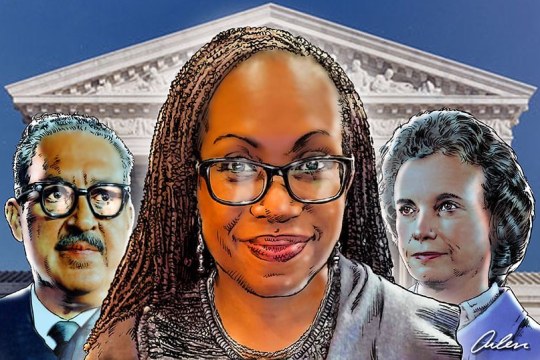
My portrait of KETANJI BROWN JACKSON, and her two groundbreaking predecessors on the Supreme Court! #ketanjibrownjackson #ketanjibrownjacksonsupremecourt #thurgoodmarshall #sandradayoconnor #supremecourt #supremecourtjustice #arlenschumer @dgareps https://www.instagram.com/p/Cc7-l3Er7ea/?igshid=NGJjMDIxMWI=
#ketanjibrownjackson#ketanjibrownjacksonsupremecourt#thurgoodmarshall#sandradayoconnor#supremecourt#supremecourtjustice#arlenschumer
0 notes
Text
Analysis of: "Alito says Congress has no authority to police Supreme Court ethics" (Washington Post)
https://www.washingtonpost.com/politics/2023/07/28/alito-ethics-supreme-court-congress/
Justice Alito said in an interview that Congress has no authority to impose an ethics policy on the Supreme Court.
Alito hinted that other justices share his view but did not disclose if any have spoken publicly about it.
Recent reports of potential ethics breaches and luxurious vacations paid for by private donors have put the Supreme Court under scrutiny.
A bill seeking to impose ethics and disclosure rules on the Supreme Court passed a Senate committee vote along party lines.
While judicial independence is important, greater transparency and ethical oversight may be needed to maintain public trust in the Supreme Court.
There are valid arguments on both sides regarding Congress's authority to impose ethical requirements versus the Supreme Court's independence.
The situation raises potential tensions with constitutional principles of separation of powers and judicial independence.
The arguments from both sides exhibit some logical fallacies that weaken their reasoning.
It is difficult to definitively evaluate Alito's ethics based on the available information.
While Alito's intentions may be ethical, his reluctance to embrace transparency and dismissive responses suggest room for improvement.
Achieving the right balance between the competing interests will require thoughtful dialogue and a nuanced approach that considers all stakeholders fairly.
Any solutions will need to preserve the Court's core independence while ensuring appropriate oversight that maintains public trust.
Summary of the document:
Justice Samuel Alito said in an interview that Congress has no authority to impose an ethics policy on the Supreme Court.
Alito hinted that other justices share this view but did not disclose if any have spoken publicly about it.
Alito notes that he and other justices comply with disclosure statutes voluntarily but imposing an ethics code would be beyond Congress's powers.
Recent reports of potential ethics breaches and luxurious vacations paid for by private donors have put the Supreme Court under scrutiny.
A bill seeking to impose ethics and disclosure rules on the Supreme Court passed a Senate committee vote along party lines.
Alito's interview with the journalist who has a case before the Supreme Court has raised questions about ethics.
Constitutional scholars are split over the role Congress can play in prescribing ethics responsibilities for the Supreme Court.
Chief Justice John Roberts declined to appear before the Senate committee to discuss the bill, citing separation of powers.
Alito has turned to the Wall Street Journal opinion section to explain himself to the public amid allegations about his relationships and private trips.
Based on the details, tone, and type of information presented, this document appears to be a news article reporting on recent developments regarding Supreme Court ethics and Congress's attempt to impose disclosure requirements.
There are several indicators that point to this genre:
The document provides factual information and summarizes multiple perspectives on the issue from Justice Alito, other justices, Chief Justice Roberts, and constitutional scholars. This is typical of a news report seeking to provide an objective and balanced overview.
The tone is impartial and objective, presenting the varying viewpoints without explicitly taking a side. News articles aim for neutrality and avoid an argumentative or opinion-based tone.
The document uses quotations and summarizes comments from relevant figures to provide context and support for the information presented. News reports cite sources to substantiate their coverage of events.
The document covers a recent development - Justice Alito's remarks in an interview - and places it within the broader context of the ongoing debate around Supreme Court ethics. News articles aim to provide timely reports on newsworthy issues.
The document refers to "allegations" and "reports" surrounding Supreme Court justices, using language typical of news coverage of controversies and controversies.
Based on these various stylistic and structural characteristics, I conclude that the genre of this document is most likely a news report summarizing recent remarks by Justice Alito regarding Congressional authority to impose ethics requirements on the Supreme Court.
The situation described in the document reflects a conflict between two important principles: judicial independence and judicial ethics.
On the one hand, Supreme Court justices argue that Congress cannot impose ethical requirements on them because it would infringe on their independence as a separate branch of government. On the other hand, recent reports of potential ethical lapses and questionable relationships have led to calls for greater transparency and accountability. Some key takeaways:
Justice Alito's forceful comments that "Congress has no authority to impose an ethics policy on the Supreme Court" represent the view that ethical oversight by Congress would violate the separation of powers and judicial independence. However, Alito acknowledges that justices currently voluntarily comply with disclosure statutes.
Recent reports about potential ethics breaches and luxurious trips paid for by donors have put pressure on the Supreme Court to demonstrate greater transparency and ethics. This has led to the proposed bill in Congress seeking to impose disclosure rules on the Court.
There is a legitimate debate among constitutional scholars about whether Congress has the power to impose an ethics code on the Supreme Court. Reasonable arguments exist on both sides, citing factors like Congress's ability to affect the Court's budget and jurisdiction.
Chief Justice Roberts' refusal to testify before Congress on the bill reflects his view that independent branches should generally not interfere with each other, in line with principles of separation of powers.
Justice Alito's decision to publicly defend himself in the Wall Street Journal suggests he feels the Court has not adequately responded to concerns about its ethics, leaving justices to defend themselves individually.
In summary, there are legitimate interests on both sides of this issue. While judicial independence is crucial, greater transparency and ethical oversight may be needed to maintain public trust in the Supreme Court. The debate centers on how to balance these competing priorities in a way that respects the Constitution and democratic values.
The key stakeholders affected by this situation include:
Supreme Court Justices: They argue that imposing ethical requirements would infringe on their independence and separation of powers as the judicial branch. However, reports of potential ethical lapses have put pressure on the Court to demonstrate greater transparency. Evaluation: Justices have a valid interest in maintaining the Court's independence, but may also benefit from clear ethical guidelines to reinforce public trust.
Congress: They seek to impose ethical and disclosure requirements on the Court through legislation, citing the need for accountability. Evaluation: Congress has a legitimate role in overseeing the functioning of the judicial branch. However, they must be careful not to interfere with the Court's independence.
The Public: Greater transparency and ethical oversight of the Court could help build public trust and confidence in the justice system. Reports of potential ethical issues threaten the Court's legitimacy. Evaluation: Transparency and accountability are important democratic values, but the Court's independence also reassures the public that justice is administered objectively. Both factors contribute to public trust.
Litigants before the Court: They have an interest in knowing justices are following high ethical standards and impartially adjudicating cases without being influenced by potential conflicts of interest. Evaluation: Clear ethical guidelines and disclosures could reassure litigants that their cases are being judged fairly. However, imposing external oversight also poses risks of interference.
The Legal Community: Some feel the organized legal community has not adequately defended the Court against "nonsense" allegations, leaving justices to respond individually. Evaluation: Legal professionals play an important role in ethically policing the judiciary while also defending its independence when appropriate.
In summary, there are reasonable interests and trade-offs on all sides. While greater transparency and ethical oversight may be needed, any reforms must be implemented in a way that preserves the Court's core function of impartial justice and its constitutionally mandated independence. A balanced approach that considers the perspectives of all stakeholders may be the best way forward.
Based on the document, the situation raises potential tensions with two key principles of the U.S. Constitution:
Separation of powers - The Constitution establishes three separate but equal branches of government: the legislative, executive, and judicial branches. The document suggests that imposing ethics requirements on the Supreme Court could violate this separation of powers by having the legislative branch interfere with the judicial branch. Justice Alito explicitly argues that "No provision in the Constitution gives them the authority to regulate the Supreme Court."
However, Congress's power of the purse and ability to set the Court's jurisdiction indicate some level of permissible oversight. The debate centers on where to draw the line between independence and accountability.
Judicial independence - The Constitution establishes the Supreme Court as an independent judiciary, free from interference by the other branches. Justice Alito and possibly other justices feel that imposing ethics requirements would infringe on this independence. Chief Justice Roberts' refusal to testify also reflects this view.
However, the Constitution does not explicitly exempt the Court from all forms of oversight. Some argue Congress has the authority to impose "reasonable regulations" in the public interest, as long as core judicial functions remain independent.
In summary, the situation highlights the need to balance two foundational constitutional principles: separation of powers/judicial independence on the one hand, and transparency/accountability on the other. There are valid arguments on both sides, and no clear answers in the constitutional text. Any solutions will need to preserve the Court's core independence while ensuring appropriate oversight that maintains public trust. The Supreme Court itself may need to provide more clarity on where it feels the constitutional boundaries lie.
Overall, the described situation raises legitimate and complex constitutional issues that stem from tensions inherent in the U.S. system of checks and balances. Reasonable people can disagree on how to best interpret and apply broad constitutional principles in this specific context. An open and respectful debate that carefully weighs constitutional text, structure, history and precedent could help chart a sensible path forward.
Based on the description, there are a few potential logical fallacies in the situation:
Appeals to tradition - Justice Alito and possibly other justices argue that Congress cannot impose ethics requirements because there is no tradition of such oversight. However, just because something has never been done before does not make it unconstitutional. Appeals to tradition can be a fallacy. Evaluation: While tradition and past practice are relevant considerations, they are not determinative. The Court should provide substantive legal and constitutional reasoning to support its position.
Special pleading - Justice Alito argues that Congress cannot regulate the Supreme Court but acknowledges that Congress can regulate lower federal courts. This unequal treatment of similar cases is a form of special pleading fallacy. Evaluation: Justice Alito does not provide a principled reason why the Supreme Court should be exempt from Congressional oversight that applies to other courts. This inconsistency weakens his argument.
Genetic fallacy - Critics argue that calls for Supreme Court ethics requirements represent a "ploy to delegitimize an increasingly conservative court." This judges the proposal based on its perceived motive rather than the merits of the idea itself, which is a genetic fallacy. Evaluation: The motivations behind the proposal are irrelevant. What matters is whether imposing ethics requirements on the Court is legally justified and practically beneficial, regardless of political motivations.
Black-and-white thinking - Both sides of the debate engage in some degree of black-and-white thinking by framing the issue as a choice between full independence vs. full oversight. In reality, there are likely nuanced positions between these extremes. Evaluation: A more balanced and moderate approach that seeks compromise between competing interests, without compromising the Court's core functions, may be possible. The "all-or-nothing" framing of the debate is overly simplistic.
In summary, while both sides raise valid considerations based on Constitutional text and structure, some of the reasoning exhibits logical fallacies that weaken the persuasive force of the arguments. A more nuanced and substantive debate focused on legal principles rather than political posturing or appeals to tradition could help move the situation toward a reasonable resolution.
Based on the details in the document, it is difficult to definitively evaluate Justice Alito's ethics. Some of the key considerations regarding his ethics are:
Alito argues that Congress cannot impose ethics requirements on the Supreme Court. However, he acknowledges that he and other justices voluntarily comply with existing disclosure statutes. This suggests he believes in at least some degree of ethical and transparency requirements.
Recent reports have questioned Alito's relationships with private donors who may have cases before the Court, including a luxurious trip paid for by a prominent hedge fund manager. Alito defended the trip as "personal hospitality" exempt from reporting. However, critics argue such relationships could pose conflicts of interest.
Alito chose to publicly defend himself in the Wall Street Journal, criticizing "nonsense" that had been written about him. This suggests he feels pressure to defend his reputation and clarify his actions amid recent scrutiny.
Alito's long interviews with a journalist who has an upcoming case before the Supreme Court have raised some eyebrows. However, the journalist's disclosure of the pending case reduces some of the potential conflict.
There is no indication Alito has actually ruled inappropriately in any cases involving people or groups with whom he has relationships. But some argue mere appearance of potential conflicts is itself problematic.
Alito has served on the Supreme Court for over 15 years without any confirmed misconduct. However, recent revelations and lack of transparency make a full evaluation of his ethics difficult.
In summary, Justice Alito appears to believe in some level of ethical responsibilities and has followed existing disclosure requirements. But questions remain about whether he has been sufficiently transparent regarding relationships that could pose conflicts of interest. There is no evidence he has directly violated ethical standards, but critics argue he has not gone far enough to alleviate concerns and maintain public trust. A lack of clear ethical guidelines for the Court as a whole contributes to the uncertainty surrounding Alito's situaion. More information would be needed for a definitive evaluation.
In conclusion, while Justice Alito's intentions may be ethical, his reluctance to embrace stronger transparency measures and dismissive characterization of some concerns as "nonsense" suggest room for improvement in his approach. Greater care regarding potential conflicts of interest and a willingness to address public concerns in a thoughtful manner would likely enhance perceptions of his ethics. However, a full and fair evaluation would require more details about his conduct and motivations.
wAwJqFOCLPhJMxgAKJoF
#SupremeCourtEthics#JudicialIndependence#CongressionalOversight#SeparationOfPowers#Transparency#Accountability#JusticeAlito#SCOTUS#SupremeCourtNews#ChecksAndBalances#Constitution#Government#LegalNews#Congress#SenateJudiciaryCommittee#ChiefJusticeRoberts#SupremeCourtJustices#BalanceOfPowers#PublicTrust#EthicsAndIntegrity#ConflictOfInterest#CongressHasNoAuthority#NonsenseAllegations#AppealToTradition#SpecialPleading#GeneticFallacy#BlackAndWhiteThinking#Debate#ComplexIssue#ConstitutionalPrinciples
1 note
·
View note
Text
#judgejackson#judgeketanjibrownjacksonsenatevote#Ketanji#ketanjibrownjacksonvote#supremecourt#supremecourtjustices
0 notes
Photo
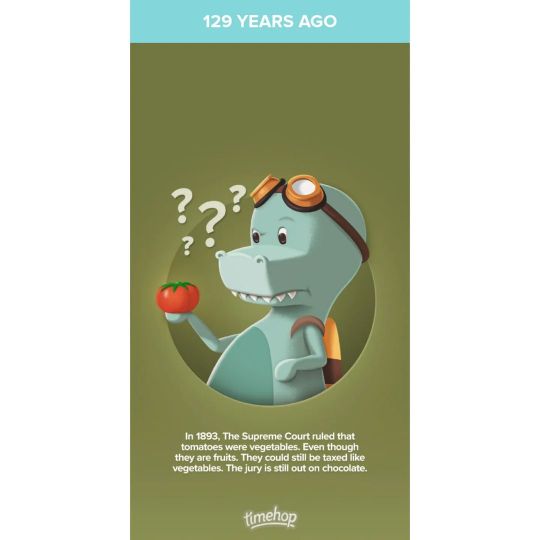
#onthisdateinhistory05101893 #otd #timehopmemories #SupremeCourtOfTheUnitedStates ruled that #Tomatoes were #Vegetables even tho they are #Fruits. They could still be taxed as #Vegetables #StupidIsAsStupidDoes The #UnitedStates is the only country that has #SupremeCourtJustices serve for life. We get what we deserve (at Supreme Court Washington Dc) https://www.instagram.com/p/CdYs77au4OG/?igshid=NGJjMDIxMWI=
#onthisdateinhistory05101893#otd#timehopmemories#supremecourtoftheunitedstates#tomatoes#vegetables#fruits#stupidisasstupiddoes#unitedstates#supremecourtjustices
0 notes
Text
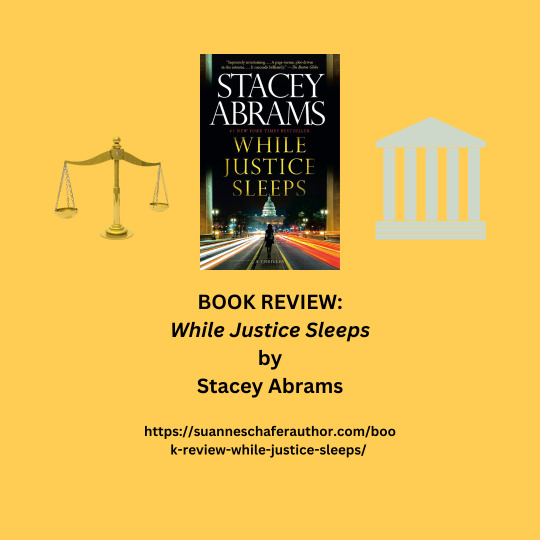
ICYMI: BOOK REVIEW of #WhileJusticeSleeps by #StacyAbrams. A tense legal thriller involving a #SupremeCourtJustice lying in a coma while his legal clerk solves the mystery of how he got there. https://suanneschaferauthor.com/book-review-while-justice-sleeps/
@staceyabramsGA @doubledaybooks
#bookstagram#am reading#Bioengineering#PoliticalThrillers#SupremeCourt#GeneticBioengineering#EthicsOfGeneticBioengineering#feminism#thrillers
2 notes
·
View notes
Photo
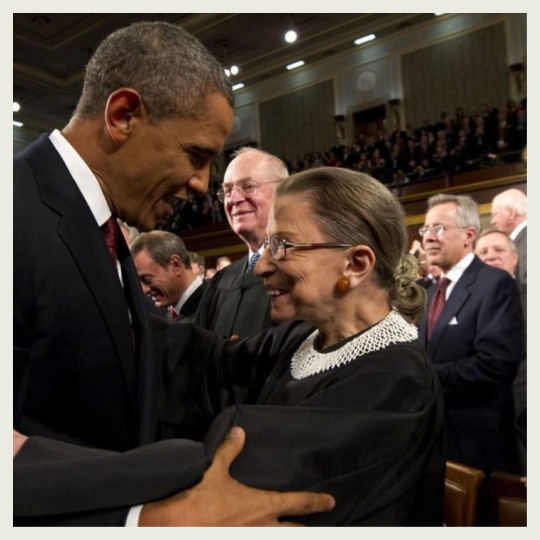
Thinking of this tiny giant of a woman on what would have been her 90th birthday ✨
4 notes
·
View notes
Text
Ketanji Brown Jackson sworn in as first Black woman Supreme Court Justice
#KetanjiBrownJackson was sworn in on Thursday as the newest Supreme Court justice — becoming the first Black woman ever to serve on the high court.
Jackson, 51, took the constitutional oath from Chief Justice John Roberts and judicial oath from 83-year-old Justice Stephen Breyer, whose retirement became official just minutes before the swearing-in ceremony.
#SupremeCourtJustice #herstory #unheardvoicesmag #Blackhistory #americanhistory

#unheardvoicesmag#unheardvoicesmagazine#ketanji brown jackson#Supreme Court Justice#black history#american history
2 notes
·
View notes
Photo

Constitutionally the functions and powers of Executive, Judiciary and Legislature are clearly defined and demarcated. Yet we come across so many instances where one organ tresspasses over the functions of the other.
Justice Markandey Katju (former Judge, Supreme Court of India) opines Obergfell Vs. Hodges is one such case, in his article. Whats Yours?
Read the article here and give your comments :
0 notes
Text
Brazil Supreme Court Justice Investigating Elon Musk Over Fake News and Alleged Obstruction
Click the link below to know more
#latestnewsfeed #latestupdates #latest #LatestUpdates #latestupdates #elonmusk #brazil #brazilsupremecourt #supremecourtjustice #SupremeCourt #supremecourtbrazil
0 notes
Text
I don't think the majority of the #SupremeCourtJustices we have now (Republicans) are the cream of the crop, nor top of their class. they are neither curious nor skilled in applying the law equitably.
0 notes